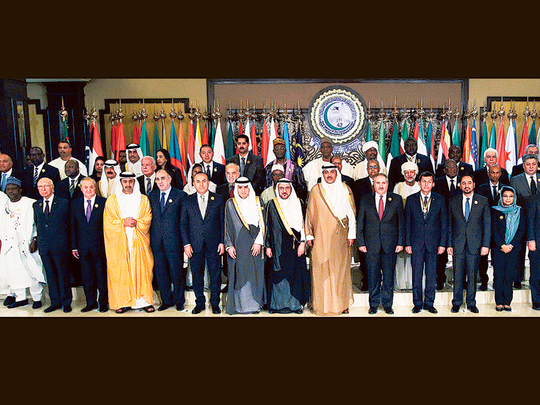
Kuwait: The phenomena of terrorism, violence, extremism and sectarianism has caused colossal damage to Islam and represents a top challenge, Saudi Foreign Minister, Adel Al Jubeir, said on Wednesday.
In a speech at the opening of the 42nd session of the Ministerial Meeting for the Organisation of Islamic Cooperation, OIC, Al Jubeir pointed out the recent “atrocious” terrorist attack that targeted a mosque in Al Qadeeh village in the city of Al Qatif in Saudi Arabia, which resulted in scores of casualties. The Saudi top diplomat said the attack goes against all Islamic and human values.
According to the Kuwaiti News Agency, KUNA, Al Jubeir also underlined his country’s keenness on sustaining joint Islamic action, noting that the Custodian of the Two Holy Mosques, King Salman Bin Abdul Aziz, had emphasised the Kingdom’s efforts in combating terrorism and extremism.
Al Jubeir also said that King Salman indicated that such “painful reality that is smeared with bloodshed and conflicts in a number of Muslim countries is nothing but a sheer outcome for the alliance between terrorism and sectarianism. Yemen is an example for such tragedy.”
As for the Palestinian Cause, Al Jubeir said it was central for the Muslim nation which is going through
a pivotal stage with regard to the legitimate rights of the Palestinian people for an independent state with East Jerusalem as its capital, in accordance with the relevant UN resolutions and the Arab Peace Initiative adopted by the 2005 OIC Summit in Makkah. H.H. Shaikh Abdullah bin Zayed Al Nahyan, Foreign Minister, headed a UAE delegation to Kuwait to participate in the 42nd session of the Council of Foreign Ministers of the Organisation of Islamic Cooperation (OIC), which was launched today.
In his opening speech of the two-day ministerial meeting, held under the theme, “Joint Vision in Promoting Tolerance and Rejecting Terrorism,” His Highness Sheikh Sabah Al Ahmad Al Jaber Al Sabah, Emir of Kuwait, reiterated his country’s position in condemning the terrorist attack on a mosque in Saudi Arabia, which claimed tens of victims, stressing Kuwait’s support to all actions Saudi has taken to confront terrorism and maintain its security.
He also expressed his deep gratitude to Saudi Arabia for what it has achieved during its presidency of the last OIC session, and for its efforts in contributing towards strengthening Islamic action.
The Kuwaiti Emir added, “We are required to intensify our efforts with the world to address the phenomenon of terrorism practiced by terrorist organisations, that has threatened the security of our countries and our stability in order to achieve the aspirations of our peoples.”
Meanwhile, Iran’s foreign minister used the summit to urged Saudi Arabia to end its military campaign in Yemen, saying the war would “bring harm” to the kingdom, Iran’s official IRNA news agency reported on Wednesday.
Iran has repeatedly condemned a Saudi-led air offensive against Yemen’s Al Houthi movement, launched in April after the Tehran-allied fighters began battling forces loyal to exiled President Abd-Rabbu Mansour Hadi for control of the country.
Zarif’s remarks were one of Tehran’s most direct attempts yet to engage Gulf Arab countries on the crisis in Yemen.
“We say to our Saudi brothers that we want a brighter future for all countries in the region, and what they are doing in Yemen will end up harming them,” Zarif was quoted as saying.












